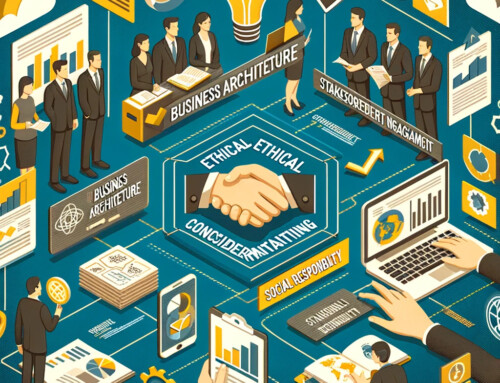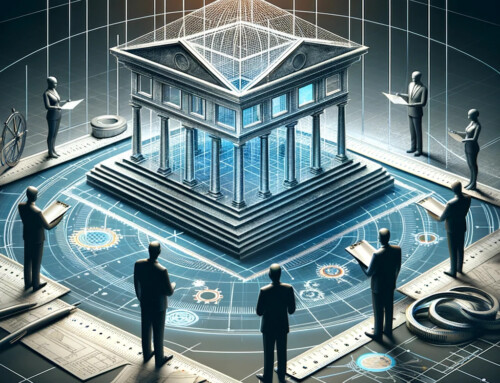
Architecting the Metaverse Enterprise.
The metaverse represents an emerging ecosystem of always-on, immersive virtual worlds interconnected via augmented reality, virtual reality, and other technologies. Enterprises across sectors are beginning to explore business models, value propositions, and consumer experiences suited for the metaverse environment. Architecting a strategic presence requires reimagining digital engagement, operations, and infrastructure across virtual and physical domains. Core principles of experimentation, interoperability, scalability and responsiveness will shape metaverse success.
Architecting the Metaverse Enterprise
Defining the Vision & Ambition
As a nascent space, the metaverse affords room for leadership and experimentation. However, realizing the full potential requires crisply defining the vision, opportunity and intended experiences for customers and employees. Ambitions could include new revenue streams, deeper consumer insights through virtual engagement, or enhanced employee training through immersion. Defining strategic themes and use cases rather than specific technologies allows flexibility as standards evolve. But ambition provides direction.
Developing Avatar & Digital Asset Strategy
In virtual worlds, avatar identity and branded digital assets will drive user engagement and transactions. Strategic design considerations include developing premium branded avatars for consumers and employees along with virtual merchandise and digital collectibles. Digital clothing and accessories that reflect brand values and personalities create appeal. Limited edition virtual products enable new revenue streams.MMS, Gucci and Nike have already unveiled virtual sneakers and apparel. Virtual concert platforms like Wave are creating new digital merchandise opportunities.
Architecting Persistent Virtual Spaces
The metaverse enables continuous brand presence and interactions through designed virtual spaces. These persistent environments allow virtual storefronts, product showrooms, and other experiences accessible across platforms and devices. Experimentation will refine designs maximizing appeal and stickiness. Consulting firm Accenture created a prototype metaverse office. Architecting persistent, interconnected virtual locations provides the setting for consumer and employee engagement.
Reimagining Customer Experiences
Virtual and augmented worlds enable more immersive, visually rich and interactive brand experiences than physical domains alone. Brands can build virtual theme parks and showrooms unconstrained by physical limitations. Automotive companies are already using VR to launch vehicles. Virtual fitting rooms and clothing customization boost apparel sales engagement. New digital experience KPIs will evolve to measure satisfaction and engagement in virtual worlds. Creative experimentation with digital formats will shape customer experiences and journeys.
Enabling Web 3.0 Social Interactions
A defining web 3.0 metaverse capability will be allowing richer social presence and user generated content through avatars, virtual messaging and 3D spatial communications. Community and content creation features foster social connections, belonging and engagement on brand platforms. Safety features for digital civility are also crucial. Unilever is already experimenting on Roblox. Social play spaces and UGC opportunities leverage user creativity to enrich experiences and deepen loyalty. The social graph will gain new dimensions.
Redesigning Workplace Collaboration
For enterprises, the metaverse unlocks new formats for hybrid work, collaboration, and productivity. Redesigned office environments in virtual worlds enhance distributed teaming. Avatar-enabled meetings boost inclusiveness, understanding and signal reading. Immersive training simulations using VR/AR improve skill development. Unilever is experimenting with VR leadership training. Heightened social presence and reduced isolation improve remote work. Meta is piloting avatar office spaces. New hybrid work models beckon.
Developing the Technology Architecture
Underpinning metaverse activities will be a robust technology architecture straddling physical and virtual. Capabilities include content creation tools, digital twins of assets, customizable digital product catalogs, virtual data rooms for IP control, blockchain enabled marketplaces, augmented interfaces and more. 5G connectivity and internet of senses technologies will fuel experiences. Cloud, AI and analytics provide the metaverse substrate. The technology architecture will continue advancing through the playbook of leaders.
Securing Data, Digital Assets & Identities
With business functions and value residing digitally in the metaverse, new data, digital IP, identity and transaction vulnerabilities emerge.Holistic security and privacy by design are crucial. Blockchain based digital ledgers enable securely recording transactions and provenance of digital assets. Spatial data access controls protect IP. Encrypted biometrics secure avatar identity. Robust governance and cyber-risk management secure the metaverse enterprise.
Fostering an Agile Innovation Mindset
The metaverse represents an arena of rapid evolution. Nimble innovation and calculated experimentation is essential to learn ahead of competitors. Companies need to foster entrepreneurial initiative with incubation labs and controlled prototyping zones. Masterclass built a virtual reality author lab in Decentraland to display known authors and onboard emerging talent. Agile iteration based on behavioral analytics tunes experiences. Absorbing lessons by pioneering concepts expands the realm of possibilities for enterprises in the metaverse realm.
The metaverse vision of immersive, connected virtual worlds represents a paradigm shift for enterprises to reimagine consumer and employee experiences. While nascent today, maturing platforms and interfaces will advance metaverse adoption. Companies have an opportunity today to shape their presence guided by user-centricity, creativity and technology innovation. Developing a compelling vision, strong digital capabilities and agile mindset will separate leaders across the virtual and physical realms of the metaverse economy.


